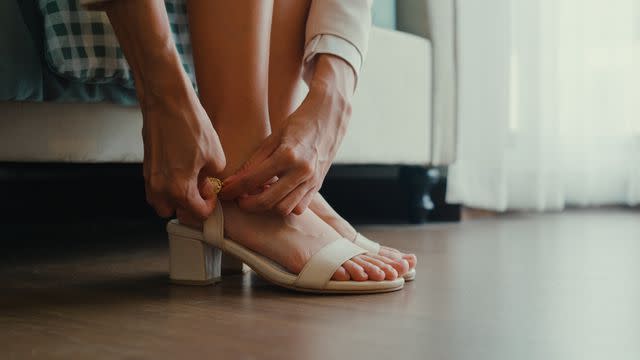When Do Your Feet Stop Growing?
Medically reviewed by Amy Kwan, PT
Your very first steps likely didn't get you very far. But soon, your feet became a driving force that got you where you wanted to go. Whether you're standing still or on the move, your feet hold you steady, support your total body weight, and act as shock absorbers when you walk, run, or jump.
Your bones start growing before birth and can grow into your early 20s. Exactly when your feet stop growing depends on when puberty begins and ends. Although the bones in your feet stop growing, other factors can affect foot width or length throughout life. These include weight gain, fallen arches, and other physical changes.
This article discusses how feet grow, when they typically stop growing, and factors affecting shoe size.
Note: To reflect our sources accurately, this article uses terms like "female," "male," "women," and "men" in the same way they are used in the sources.

MTStock Studio / Getty Images
How Do Feet Grow?
Regarding the anatomy of the foot, there are 26 bones, 30 joints, and more than 100 muscles, tendons, and ligaments in each foot.
Bones in your feet, like other long bones, have growth plates. That's an area at the end of a bone containing cartilage cells that eventually become bone. All your bones grow from the regions of the growth plates. Your bones continue to grow until the growth plates harden or close.
The point at which growth plates close differs for everyone, but it's influenced by growth hormones and sex hormones from the ovaries and testes. Some people may reach their early 20s before growth plates completely close.
When Do Feet Stop Growing in Males?
Feet generally stop growing when you stop growing in height. Research suggests that the peak increase in shoe size for males happens just before puberty, at about 11.5 years of age. But feet continue to change throughout adolescence.
On average, growth plates in males tend to close around age 16 or 17.
When Do Feet Stop Growing in Females?
Your feet usually reach full size as you reach full height. In females, the peak increase in shoe size happens just before puberty, at about 10.4 years of age. However, your feet keep changing until late adolescence.
In females, growth plates tend to close around age 14 or 15.
Is It Possible for Feet to Never Stop Growing?
The bones in your feet stop growing when your growth plates close.
Continued actual growth is not possible. However, your body never stops changing. Your feet may get longer or wider due to injuries, weakened muscles, ligaments that cause fallen arches, or health conditions that cause structural changes in the foot.
What Causes Your Feet to Change in Size Later in Life?
People spend a lot of time on their feet. In fact, by age 50, most people will have put at least 75,000 miles on their feet. Even though your feet are no longer growing, aging affects your feet in ways that can affect shoe size.
By age 50, you likely will have lost half the fatty padding on the soles of your feet and some elasticity in the ligaments, which can cause the arches to fall. Flat feet can make your feet longer and wider. In addition to aging, other causes of flat feet are:
Weight gain and having obesity
Injuries to the feet or ankles
You might need wider shoes and more toe room if you develop bunions. A bunion is a bony lump inside the forefoot at the big toe joint. A bunion that forms at the joint of the little toe is called a bunionette.
Bunions tend to get worse over time and sometimes cause the big toe to shift toward the other toes. Bunions are more common in women than men, and 70% of people who develop bunions have a family history of them.
You can also get bunions from shoes that don't fit properly, especially those with narrow, pointed toes.
Does Pregnancy Cause Your Feet to Get Bigger?
Your feet don't grow during pregnancy, but you might need a bigger shoe size. That's because pregnancy, especially the first one, can cause permanent structural changes in the feet.
During pregnancy, ligaments are more relaxed, and there's also extra weight on joints and ligaments. This can cause the arch to drop and lengthen the foot.
When to Contact a Healthcare Provider
If you're concerned about changes in foot size, see a foot specialist (podiatrist) or other healthcare provider. In the meantime, it's important to wear the correct size shoes. Shoes that don't fit properly can cause foot problems. You should also consider seeing a provider if you have:
A bunion
Ulcers that don't heal (could be a sign of diabetes)
Swelling (could be a sign of diabetes, heart disease, or other problems)
Summary
Most of the bones in your body, including the feet, stop growing after puberty. Even so, you may find that you need a bigger shoe size. Factors affecting the width and length of your feet include weight increases, pregnancy, and fallen arches due to weakened muscles and ligaments.
It's a good idea to measure your feet every few years to see if you need to adjust your shoe size because these changes are usually permanent. See a healthcare provider if you have persistent foot pain, swelling, or other problems with your feet.
Read the original article on Verywell Health.

